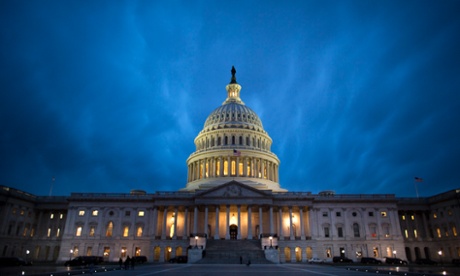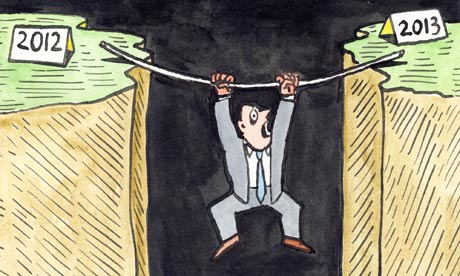This
fiscal cliff deal doesn't stop tax hikes, doesn't reduce the deficit,
doesn't avoid spending cuts … and it's not even a deal

The Capitol as the US went over the 'fiscal cliff' in Washington, DC. Photograph: Jim Lo Scalzo/EPA
It is a habit of the United States Congress never to congratulate itself until it has utterly failed to accomplish what it set out to do. Needless to say, the Congress is particularly delighted with its work in leaping over the fiscal cliff last night.
Of course, it will never be put that way. Amid the usual Washington smoke and mirrors, lawmakers will talk about the benefits of the deal: it will cut taxes; it has come in time to avoid the real fiscal cliff; it will reduce the US budget deficit; it will represent a bipartisan agreement to fix America's debt problems.
It does precisely none of those things.
The much-praised deal is as thoughtless and hasty as you would expect from anything cobbled together at the last minute. Lawmakers should regard it not with self-congratulatory glee, but with suitable shame at their failure to think through major issues that impact the American economy. As the humorist Andy Borowitz concisely put it on Twitter this morning:
Praising Congress for the fiscal cliff deal is like giving an arsonist an award for putting out his own fire.
Tax cuts – and hikes
While the Senate agreement was designed to protect the middle class by allowing the Bush era tax cuts to rise for people making $450,000 and above, don't believe anyone who tells you that it's a tax cut. In fact, all Americans are going to be paying higher taxes through their paychecks, starting today 1 January, because Congress has allowed the payroll tax cut to lapse. President Obama cut the payroll tax to 4.2% from 6.2% in 2010; now, those taxes are going back up.The cost is noticeable. It will amount to $1,000 a year out of the pocket of Americans making $50,000pa. That could be a mortgage payment, or nearly a year's cellphone bills, or a vacation.
In addition, the middle-class Bush era tax cuts will be extended for only five more years, so expect more dithering in 2018 about the value of the middle class to the US economy. Luckily, that will only be a year for midterm elections that affect Congress, not another presidential election.
Spending cuts: sequester postponed
Nor does the deal avoid the uncertainty and economic disaster avoided with the fiscal cliff. In fact, it creates an even bigger cliff – really, a fiscal mountain – in March. The Senate refused to come to an agreement on the actual "cliff" part of the fiscal cliff: sweeping government spending cuts that were designed in 2011 to be so stupidly punitive that they would never be passed. Instead of sitting down and thoughtfully coming up with a new set of spending cuts, the Senate has pushed the issue off for two months. That deadline coincides with the moment that the US will hit its debt limit.The result: the new fiscal cliff will have even higher stakes, as the US could spend the next two months wrestling with even greater potential economic disaster, and a more dire impact on the markets. Now, it's not just some spending cuts that are on the table; it's the full faith and credit of the US government. That was already proven in 2011 to be an ill-judged candidate for congressional toying, but the addiction of the drama and adrenaline appears to be too much to resist for those in Congress.
The deficit and debt: revenues reduced
As for the deficit, that will actually grow under this deal, partly because the tax cuts now don't apply to many of the rich. When the president aimed for $250,000 in income and above for tax hikes, that encompassed about 2% of American taxpayers. But the new $450,000 threshold covers less than 1% of Americans. That means less money to cut the deficit, and more coming in spending cuts – very likely, to important government programs.A deal far from done
And lastly, the bipartisan nature of the deal is something that is unlikely to last after the House meets to talk about it this New Year's Day. Whatever joy the Senate has with its 89-8 landslide agreement achieved at the ungodly hour of 2.07am, news channels featured an endless stream of Republican lawmakers in the House of Representatives talking about their unlikeliness to vote for the deal. One of them compared his plan to vote against the deal to dying in honor on a battlefield.The deal is not a complete disaster, although most of what it does well is completely and obviously necessary. The best thing that it does is extend unemployment benefits for millions of Americans – at least, for another year – and revoke an ill-judged $900m automatic pay hike for members of Congress. It also extends tax breaks for research and development and interest on student loans: this is important as student loan debt now exceeds credit card debt in the United States.
So, after a day, and week, and year filled with manufactured drama, the US Senate not only failed its only goal – reducing the US deficit – but also built a mountain range out of the molehill of budget talks. But tell that to lawmakers patting themselves on the back.
"For the first time in years, we will have a major issue settled with a bipartisan vote," Senator Dianne Feinstein crowed. Vice-President Biden, asked what was his selling point to Senate Democrats, modestly declared, "Me." He expanded later on how he did it – not with reasoned arguments about the duty of the Congress and the American economy, but with this folksy negotiation tactic: "I said, 'this is Joe Biden and I'm your buddy.'" Harry Reid graded his fellow failing congressional students on a curve: "It's disappointing that we didn't get the grand bargain … but we tried."
Well, at least they tried, right? Except that won't be good enough for the millions of Americans who have their pensions invested in the stock market and the bond market. We already know that the markets don't care a fig about tax policy; but when it comes to the debt limit, they react disastrously.
Columbia Professor Emanuel Derman depended on a classic quote when he tweeted his reaction to the Senate's last-minute deal for the fiscal cliff:
1 Jan 13
@TheStalwart @mikememoli @VP This is all theater. Tale told by idiot, full of sound and fury, signifying nothing.#fiscalcliff




